Kajabi Review: Honest Review of Course Creation Platform
If you’re considering selling online courses, memberships, or group coaching, Kajabi is highly recommended. As someone who has sold six figures in online courses and coaching programs.
Kajabi is an all-in-one platform designed for experts, coaches, and thought leaders to easily sell their knowledge through online courses, coaching, and communities. Its extensive functionality is impressive, making it a strong contender as your go-to software.
While my experience with Kajabi has been largely positive, this in-depth kajabi review will address various aspects to provide a comprehensive understanding.
In this review, I’ll share my personal pros and cons to help you decide if Kajabi is right for you.
This detailed analysis aims to save you hours of research, giving you a clear picture of whether Kajabi is the perfect fit for your business needs.
Kajabi Overview:
A comparison table summarizing the key aspects of Kajabi, a popular platform for creating and selling online courses, memberships, and other digital products.
| Company type | Private |
| Industry | Advertising and marketing |
| Founded | 2010 |
| Founder | Kenny Rueter |
| Headquarters | Irvine, California, U.S. |
| Products | Kajabi SaaS platform for selling digital content |
| Feature | Description |
|---|---|
| Platform Type | All-in-one platform for digital products |
| Primary Use Cases | Online courses, membership sites, coaching programs, digital downloads |
| Ease of Use | User-friendly with drag-and-drop features, suitable for non-technical users |
| Course Creation | Robust course creation tools, including quizzes, assessments, and drip content |
| Membership Sites | Built-in membership site functionality |
| Marketing Tools | Integrated email marketing, automation, funnels, and pipelines |
| Website Builder | Customizable website themes and a drag-and-drop builder |
| Blogging | Built-in blogging platform to drive organic traffic |
| Payment Integration | Supports multiple payment gateways including Stripe and PayPal |
| Analytics | Detailed analytics and reporting for sales, traffic, and customer behavior |
| Customer Support | 24/7 live chat, email support, extensive knowledge base, and community forums |
| Third-Party Integrations | Integrates with tools like Zapier, Mailchimp, ClickFunnels, and more |
| Pricing | Subscription-based with four tiers: Kickstarter, Basic, Growth, and Pro; pricing starts at $69/month |
| Free Trial | 14-day free trial available |
| Mobile App | Kajabi offers a mobile app for both iOS and Android for course access on the go |
| Community Features | Built-in community feature for creating discussions and engaging with members |
| Custom Domains | Supports custom domains for branding |
| Security | SSL certificates, GDPR compliant, and robust security measures |
| Affiliate Program | Built-in affiliate marketing tools to create and manage affiliate programs |
| Video Hosting | Unlimited video hosting included in the platform |
| Templates | Professionally designed templates for courses, landing pages, and emails |
| Scalability | Scalable to support growing businesses, with higher-tier plans offering more features and capabilities |
Pros and Cons of Kajabi
Pros:
Cons:
What Is Kajabi?
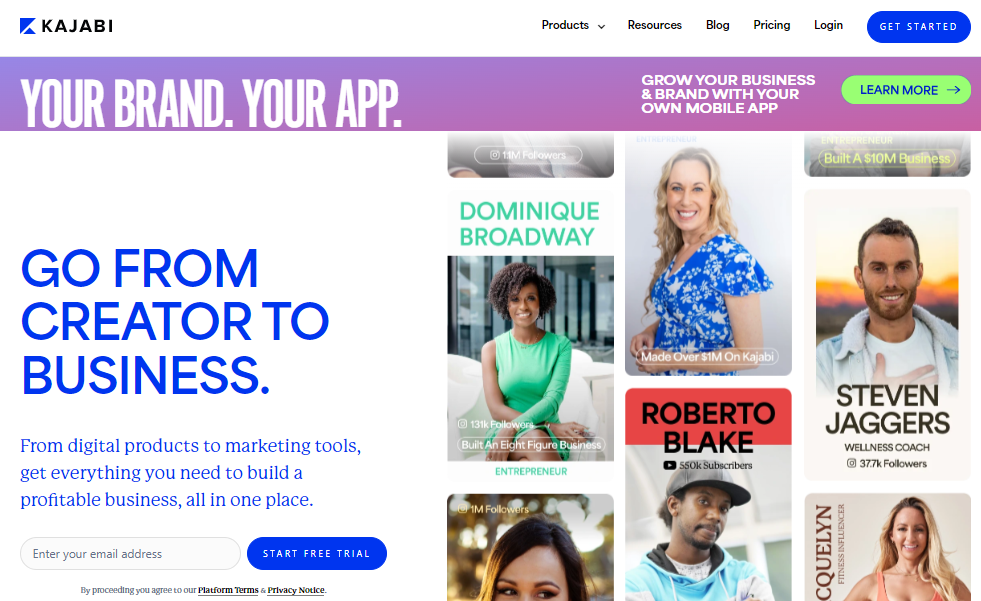
Kajabi is an all-in-one platform that empowers users to create, market, and sell online courses, memberships, and digital products without needing technical expertise.
It simplifies the process of building and managing an online business by providing tools for website creation, content hosting, email marketing, and sales management. Think of it as your virtual storefront where you can showcase your expertise and offerings to a global audience.
With Kajabi, you can easily design engaging courses, interact with your audience through emails and discussions, and track your sales and growth—all from one intuitive dashboard. It’s like having your own digital business assistant, simplifying everything from content creation to customer engagement.
Who Owns Kajabi?

Kajabi is a privately held company, so the specific ownership details might not be publicly available. It was founded by Kenny Rueter and Travis Rosser in 2010.
Who Is Kajabi for?
Kajabi’s user base typically includes entrepreneurs, course creators, coaches, consultants, and anyone seeking to monetize their knowledge and expertise by offering digital products or services. Here’s a closer look at who Kajabi is for:
- Online Course Creators: Kajabi is ideal for individuals or businesses looking to create and sell online courses. If you’re a seasoned educator, professional, or knowledgeable hobbyist, Kajabi gives you the tools you need to create, market, and sell your courses easily.
- Coaches and Consultants: For coaches, consultants, and mentors, Kajabi offers a platform to package and deliver their expertise to clients worldwide. Perhaps you offer individual coaching, group coaching programs, or mastermind sessions. Kajabi helps you to automate your business operations and focus on providing value to your clients.
- Entrepreneurs and Small Businesses: Kajabi empowers entrepreneurs and small businesses to create online products and services, including memberships, digital downloads, webinars, and more. It serves as an all-in-one solution for building websites, managing content, processing payments, and nurturing customer relationships, making it an invaluable tool for those looking to establish or scale their online presence.
- Authors and Speakers: Authors and speakers can leverage Kajabi to expand their reach beyond traditional publishing or speaking engagements. They can increase audience engagement, generate recurring revenue, and position themselves as thought leaders in their fields by developing digital courses, seminars, or membership groups.
- Creative Professionals: From photographers and designers to musicians and artists, creative professionals can use Kajabi to monetize their skills and creations. Users can interact with a global audience and showcase their skills on Kajabi. They are offering creative services, hosting online workshops, or selling digital artwork.
- Educational Institutions: Kajabi is also suitable for educational institutions, schools, and universities looking to supplement traditional learning with online courses or training programs. It enables educators to create interactive and engaging learning experiences for students, whether as part of a formal curriculum or as supplemental materials.
Kajabi Pricing:
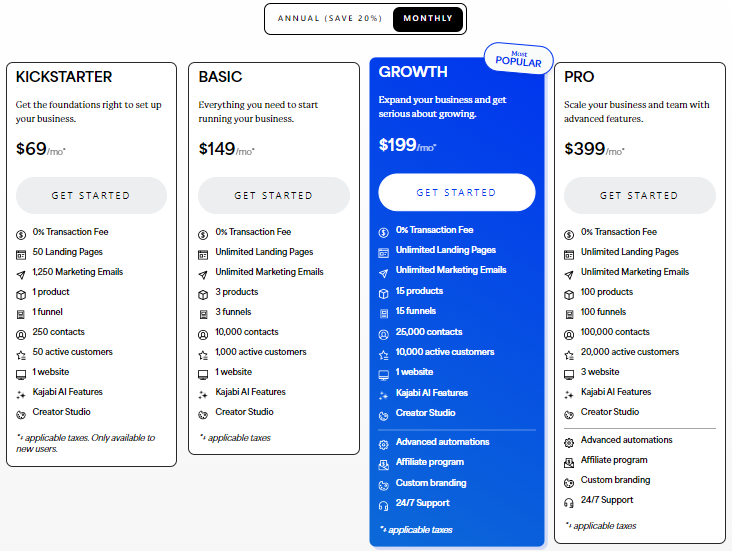
| KICKSTARTER | BASIC | GROWTH | PRO |
|---|---|---|---|
| $69/mo | $149/mo | $199/mo | $399/mo |
| $55/mo – Billed Annually | $119/mo – Billed Annually | $159/mo – Billed Annually | $319/mo – Billed Annually |
Kajabi Features:
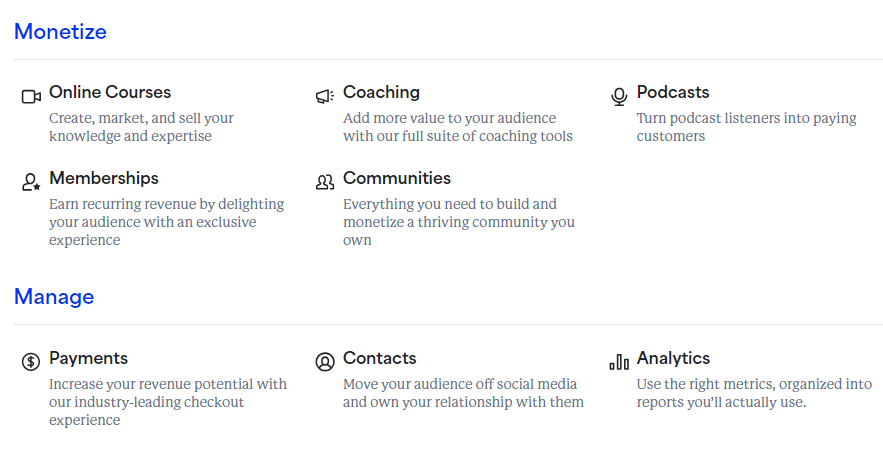
In this section, we’ll explore the key features of Kajabi and write into their details to help you understand how each component contributes to the platform’s functionality and effectiveness.
1. Products
At the core of Kajabi lies its product management feature, which allows users to create and organize their digital offerings efficiently. Kajabi offers a user-friendly interface for creating and customizing products, be it digital downloads, coaching services, membership programs, or online courses. Users can easily upload content, set pricing, and manage access, making it simple to monetize their expertise.
2. Courses
With Kajabi’s robust course creation tools, users can design engaging and interactive learning experiences for their audience. From video lessons and quizzes to drip content scheduling and progress tracking, Kajabi offers all the necessary features to deliver high-quality online courses. The platform’s intuitive course builder empowers users to structure their content effectively and provide value to their students.
3. Websites
Kajabi eliminates the need for third-party website builders by offering built-in website creation capabilities. Users can design professional and mobile-responsive websites using customizable templates and themes. It might be a full-fledged website for their business or a landing page for a new product. Without knowing how to code, Kajabi gives users the ability to construct visually appealing and useful websites.
4. Payments
Streamlining the payment process is crucial for any online business, and Kajabi simplifies this aspect with its integrated payment system. Users can securely accept payments for their products and services using multiple payment gateways, including credit cards and PayPal. Additionally, Kajabi handles all aspects of transaction management, from processing payments to issuing refunds, allowing users to focus on growing their business.
5. Analytics
Data-driven decision-making is key to optimizing business performance, and Kajabi’s analytics feature provides users with valuable insights into their audience and sales performance. From tracking website traffic and user engagement to monitoring sales trends and conversion rates, Kajabi’s analytics dashboard offers a comprehensive overview of key metrics. This data empowers users to identify areas for improvement and refine their marketing strategies effectively.
6. Email
Effective communication is essential for nurturing customer relationships and driving sales, and Kajabi’s email marketing tools make it easy to engage with subscribers. Users can create and send targeted email campaigns, automate follow-up sequences, and segment their audience based on various criteria. With built-in analytics, users can track email performance and optimize their campaigns for maximum impact.
7. Pages
Kajabi’s page builder feature enables users to create customized landing pages, sales pages, and thank-you pages to promote their products and capture leads. With drag-and-drop functionality and pre-designed templates, users can design visually appealing pages that drive conversions. With the tools provided by Kajabi, creating high-converting landing pages for new product launches or special offers is simple.
8. Branded Mobile App
In today’s mobile-centric world, having a branded mobile app can enhance user engagement and brand loyalty. Kajabi offers a branded mobile app feature that allows users to create their own mobile app for iOS and Android devices. With custom branding and seamless integration with their Kajabi products, users can provide their audience with a personalized mobile experience that extends their brand presence beyond the web.
9. Funnels
Sales funnels are a fundamental component of online marketing, and Kajabi’s funnel builder feature simplifies the process of creating and optimizing sales funnels. Users can design multi-step funnels to guide prospects through the buyer’s journey, from awareness to conversion. With pre-built funnel templates and customizable elements, users can quickly launch high-converting sales funnels tailored to their specific goals.
10. Contacts
Managing customer relationships is essential for long-term business success, and Kajabi’s contact management feature makes it easy to organize and engage with contacts effectively. Users can capture and store contact information, track interactions, and segment contacts based on their behavior and interests. With built-in email and marketing automation capabilities, users can nurture leads and convert them into loyal customers.
11. Memberships
Building a thriving online community is made simple with Kajabi’s membership feature, which allows users to create and manage membership sites with ease. Kajabi gives users all the resources they need to provide value to members and create a feeling of community, including community forums, live events, and unique content. Users can customize membership levels, drip content, and automate member management tasks to streamline operations.
12. Coaching
For entrepreneurs and professionals looking to offer coaching services, Kajabi’s coaching feature provides a platform to connect with clients and deliver personalized coaching experiences. Users can schedule appointments, conduct virtual sessions, and securely communicate with clients within the platform. With integrated payment processing and client management tools, Kajabi simplifies the entire coaching process from start to finish.
13. Podcasts
Podcasting has emerged as a popular medium for content creators to share their expertise and connect with audiences, and Kajabi’s podcasting feature offers a seamless solution for hosting and distributing podcasts. Users can upload and publish podcast episodes directly from the platform, customize their podcast channel, and track listener metrics. With built-in marketing tools, users can promote their podcast and grow their audience effectively.
14. Integrations
While Kajabi offers a comprehensive suite of features, it also integrates seamlessly with a wide range of third-party tools and services to enhance functionality and flexibility. From email marketing platforms and CRM systems to payment gateways and analytics tools, Kajabi’s integrations ensure compatibility with existing workflows and enable users to leverage their favorite tools within the platform.
Kajabi Integrations:
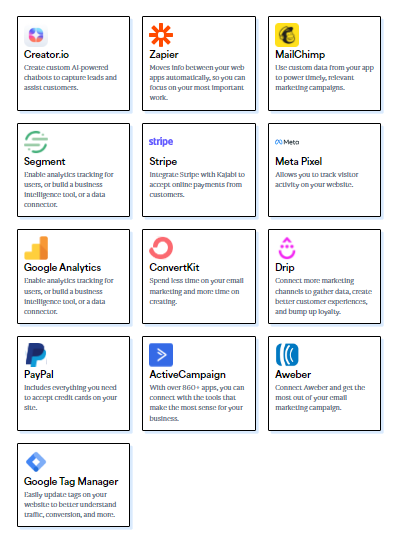
However, to truly unlock its full potential, integrating with other tools and services is essential. We’ll explore 13 of the top integrations for Kajabi and how they can supercharge your online business.
1. Creator.io
Creator.io is a robust analytics and insights platform designed specifically for creators. Integrating Creator.io with Kajabi allows you to acquire useful insights into your audience’s activity, track critical performance indicators, and optimize your marketing campaigns. From tracking conversion rates to analyzing engagement metrics, Creator.io provides actionable data to help you make informed decisions and grow your business.
2. Zapier
Zapier is a powerful automation tool that connects Kajabi with thousands of other apps and services. With Zapier, you can automate repetitive tasks, streamline your workflows, and save valuable time. Whether it’s automatically adding new Kajabi customers to your email list or triggering follow-up actions based on user interactions. Zapier allows you to create custom integrations without any coding knowledge.
3. MailChimp
Email marketing remains one of the most effective ways to engage with your audience and drive conversions. Integrating MailChimp with Kajabi permits you to seamlessly connect your contacts, develop customized email campaigns, and track email performance. With MailChimp’s many options, you can send newsletters, offers, or automatic sequences that are relevant to your audience.
4. Segment
Segment is a customer data platform that helps you collect, clean, and unify your data across various touchpoints. Integrating Segment with Kajabi helps you to combine data from many sources, including your website, mobile app, and third-party tools, into a single, comprehensive view of your audience. This unified data enables you to better understand your customers, personalize their experiences, and drive meaningful interactions at every stage of the customer journey.
5. Stripe
Stripe is a leading payment processor that enables businesses to accept online payments securely and efficiently. Stripe integration with Kajabi assists you in effortlessly setting up payment gateways, executing transactions, and managing digital product subscriptions. With Stripe’s flexible pricing options and advanced fraud detection capabilities, you can optimize your revenue streams and provide a seamless checkout experience for your customers.
6. Meta Pixel
The Facebook Pixel is a powerful tracking tool that allows you to measure the effectiveness of your advertising campaigns on Facebook and Instagram. Integrating the Meta Pixel with Kajabi helps you to track conversions, retarget website visitors, and optimize your ad spend for optimal ROI. The Meta Pixel provides invaluable data to help you optimize your targeting and increase conversions. Regardless of assuming you are personally marketing your products or managing lead-generating campaigns.
7. Google Analytics
Understanding how users interact with your website is crucial for optimizing your online presence and driving growth. Integrating Google Analytics with Kajabi allows you to monitor critical data such as website traffic, user engagement, and conversion rates. With access to detailed reports and real-time insights, you can identify trends, uncover opportunities, and make data-driven decisions to improve your website performance and user experience.
8. ConvertKit
ConvertKit is a popular email marketing platform designed specifically for creators and online entrepreneurs. ConvertKit and Kajabi can be integrated to take advantage of Kajabi’s robust automation tools for lead nurturing, audience segmentation, and content delivery. You’re running email courses, launching new products, or building sales funnels. ConvertKit’s intuitive interface and customizable workflows empower you to create personalized experiences that drive results.
9. Drip
Drip is an e-commerce CRM that helps businesses automate their marketing efforts and build meaningful relationships with their customers. By integrating Drip with Kajabi, you can capture leads, track customer behavior, and deliver personalized experiences across multiple channels. Drip’s sophisticated features, such as sending abandoned cart emails, initiating upsell campaigns, and segmenting your audience based on interactions. That allows you to engage with your customers at every touchpoint and promote long-term loyalty.
10. PayPal
PayPal is a trusted payment solution that enables businesses to accept online payments securely and conveniently. You may provide your clients with a range of payment choices, such as credit cards, debit cards, and PayPal accounts, by integrating PayPal with Kajabi. With seamless checkout experiences and robust fraud protection measures, PayPal helps you increase conversion rates and build trust with your audience.
11. ActiveCampaign
ActiveCampaign is a comprehensive marketing automation platform that empowers businesses to automate their marketing efforts and personalize customer experiences. You can collect leads, segment your audience, and provide clients with relevant content by connecting ActiveCampaign with Kajabi. You can increase engagement and conversions throughout your whole marketing funnel by using ActiveCampaign’s sophisticated features. Which include tracking user activities, delivering tailored email campaigns, and automating follow-up sequences.
12. AWeber
Aweber is an email marketing platform that helps businesses build and nurture relationships with their audience through automated email campaigns. You can seamlessly connect your contacts, generate customized email sequences, and track campaign performance by integrating Aweber and Kajabi. If you are nurturing leads, promoting new products, or re-engaging dormant subscribers. Aweber’s user-friendly interface and extensive automation capabilities enable you to create personalized experiences that produce results.
13. Google Tag Manager
Google Tag Manager is a powerful tool that allows you to manage and deploy tracking codes on your website without any coding knowledge. Google Tag Manager integration with Kajabi allows you to effortlessly add and edit tags, track user interactions, and collect useful data for analysis. Regardless of when you’re using third-party scripts, tracking conversions, or keeping an eye on user activity. Google Tag Manager simplifies the procedure and guarantees precise data collection for well-informed decision-making.
Kajabi Customer Support:
Kajabi Customer Support is renowned for its excellence in providing assistance to users of the Kajabi platform. With such a wide array of features, users often require guidance and troubleshooting, making reliable customer support essential.
The hallmark of Kajabi’s customer support is its responsiveness and expertise. Users can reach out to Kajabi’s support team through various channels, including email, live chat, and a help center. Regardless of the method chosen, users can expect prompt and helpful responses from knowledgeable support representatives.
One of the key strengths of Kajabi’s customer support is its proactive approach to problem-solving. Support agents not only address user inquiries but also anticipate potential issues and provide proactive guidance to prevent them. This proactive stance helps users navigate the platform more effectively and maximize its capabilities for their online business endeavors.
Furthermore, Kajabi’s customer support is known for its friendly and empathetic approach. Whether users are facing technical challenges, need advice on platform features, or require assistance with marketing strategies, support representatives handle inquiries with patience and understanding. This creates a positive experience for users and fosters trust in the Kajabi brand.
Moreover, Kajabi offers a robust knowledge base and community forum where users can find answers to common questions, share tips and best practices, and connect with fellow Kajabi users. This self-service aspect of customer support empowers users to troubleshoot issues independently while also fostering a sense of community among Kajabi users.
In summary, Kajabi Customer Support stands out for its responsiveness, expertise, proactive approach, and friendly demeanor. Kajabi ensures that users may use its platform to achieve their online business goals by providing thorough assistance and cultivating a friendly community.
Kinds of Kajabi’s Customer Reviews:
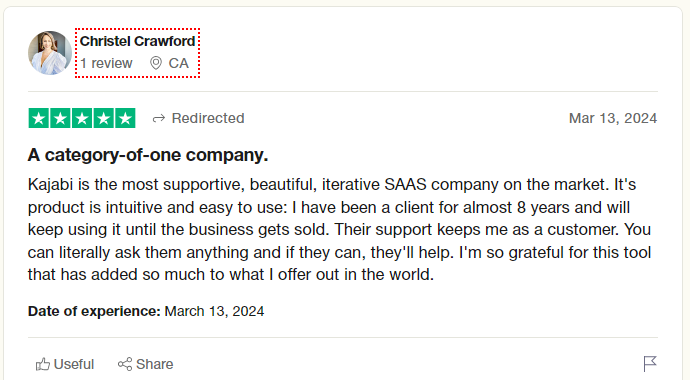
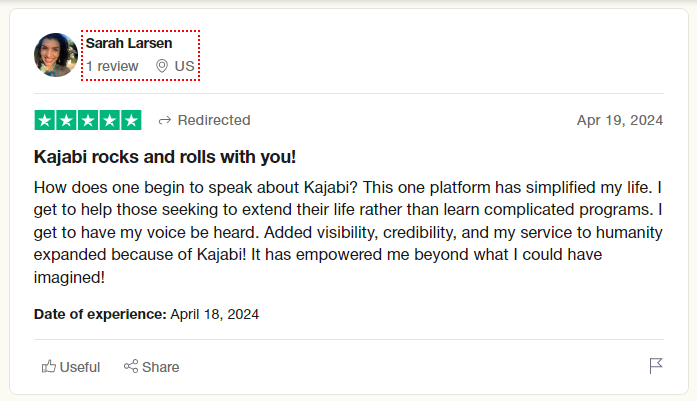
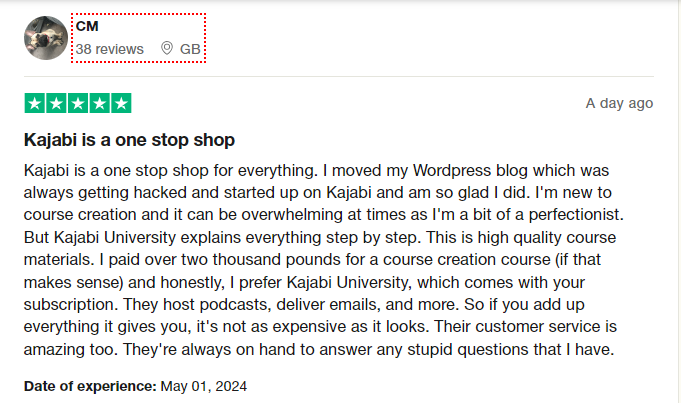
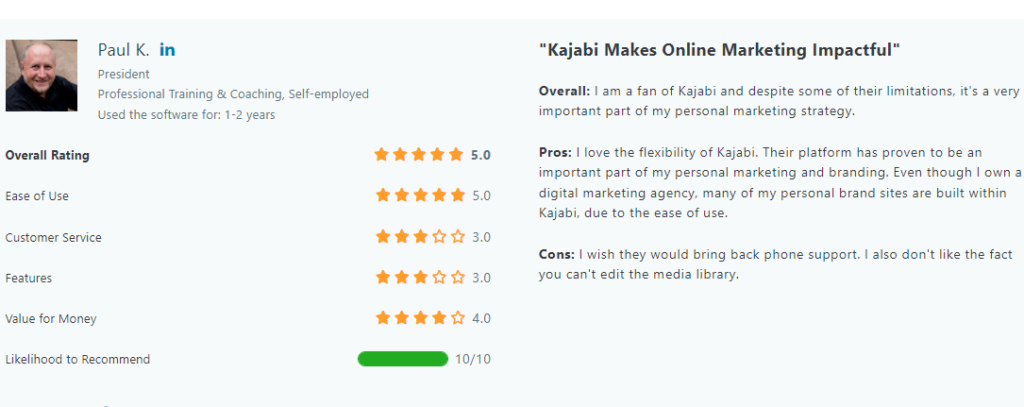
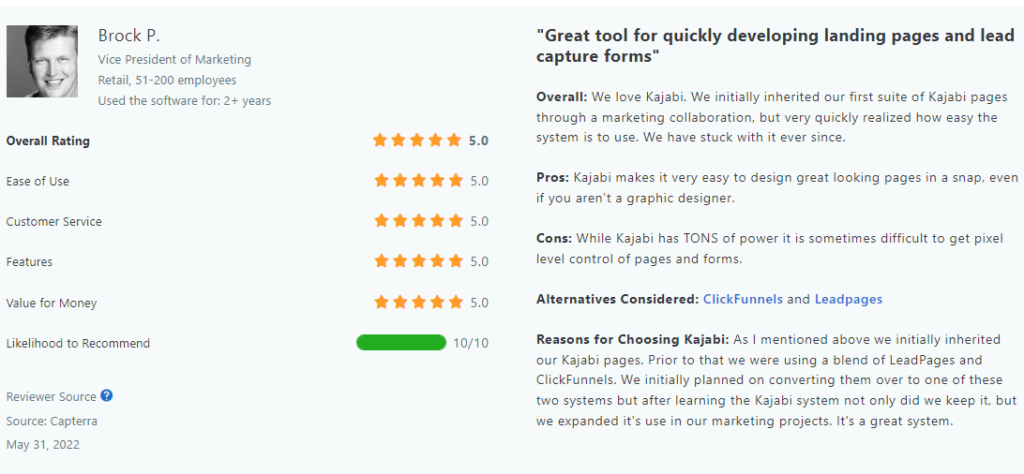
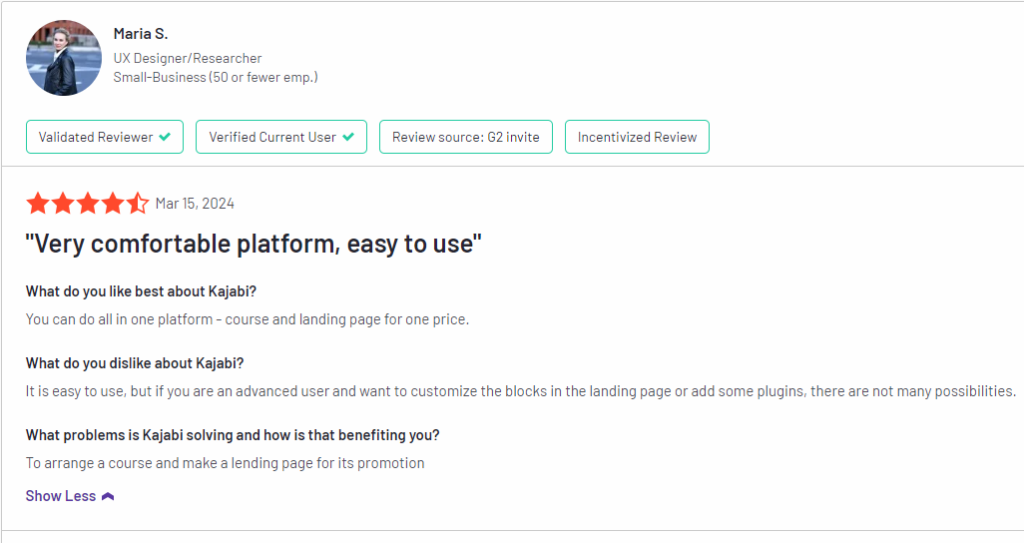
10 Steps: How to Create an Online Course On Kajabi?
Creating an online course on Kajabi is a great way to share your knowledge and expertise with a wide audience. 11 steps guide to help you get started:
Step 1: Sign Up for Kajabi
First, you’ll need to sign up for a Kajabi account if you haven’t already. Go to the Kajabi website and choose a plan that suits your needs.
Step 2: Plan Your Course
Before you start building your course on Kajabi, take some time to plan it out. Decide on the topic, the target audience, and what you want to teach in each module or lesson.
Step 3: Create Your Course Content
Once you have a plan in place, start creating your course content. This could include video lessons, written content, quizzes, worksheets, or any other materials you want to include.
Step 4: Set Up Your Course on Kajabi
Log in to your Kajabi account and navigate to the “Products” tab. Click on “New Product” and choose “Online Course” from the options. Enter the details of your course, such as the title, description, pricing, and any other settings you want to configure.
Step 5: Add Content to Your Course
Once you’ve set up your course, you can start adding your content to it. Kajabi makes it easy to upload videos, documents, and other materials, and you can organize them into modules and lessons.
Step 6: Customize Your Course Website
Kajabi allows you to customize the look and feel of your course website, so it matches your branding and style. You can choose from a variety of themes and templates, and customize them to suit your needs.
Step 7: Set Up Payment and Enrollment
If you’re planning to charge for your course, you’ll need to set up payment processing and enrollment options. Kajabi integrates with Stripe and PayPal, so you can easily accept payments from your students.
Step 8: Test Your Course
Before you launch your course, be sure to test it thoroughly to make sure everything is working correctly. Enroll yourself as a student and go through the course to check for any errors or issues.
Step 9: Launch Your Course
Once you’re satisfied with your course, it’s time to launch it! You can announce your course launch to your audience through email, social media, or other channels, and start enrolling students.
Step 10: Promote Your Course
Once your course is live, don’t forget to continue promoting it to attract new students. You can use Kajabi’s built-in marketing tools to create sales pages, email campaigns, and other promotional materials.
8 Ways to Make Money with Kajabi?
Kajabi is a platform that enables users to create, market, and sell online courses, memberships, and digital products. 8 ways you can make money with Kajabi:
- Online Courses: Create and sell online courses on topics you’re knowledgeable about. Kajabi provides tools to build multimedia-rich courses with videos, quizzes, downloads, and more.
- Membership Sites: Offer premium content through membership sites. You can provide exclusive access to resources, community forums, live Q&A sessions, and more, charging a recurring subscription fee.
- Digital Products: Sell digital products like eBooks, templates, worksheets, or software tools related to your niche. Kajabi allows you to set up product sales pages with secure payment processing.
- Coaching and Consulting Services: Use Kajabi to offer coaching or consulting services. You can sell one-on-one sessions, group coaching programs, or access to online coaching content.
- Webinars and Workshops: Host paid webinars or workshops on Kajabi. Offer valuable content and charge attendees for access. Kajabi provides features for webinar registration, live streaming, and replays.
- Affiliate Marketing: Utilize Kajabi’s affiliate program feature to partner with others who promote your products or courses in exchange for a commission on sales generated through their referrals.
- Bundle Offers and Upsells: Create bundle offers by combining multiple products or courses at a discounted price. Implement upsells within your sales funnel to encourage customers to purchase additional products or upgrades.
- Content Monetization: Monetize your content through various channels, such as selling access to premium content, offering sponsorships or advertisements, or partnering with brands for sponsored content.
23 Kajabi Alternatives
Here’s a brief overview of each alternative:
- Thinkific: Known for its user-friendly interface and extensive customization options, Thinkific allows users to create and sell online courses easily. It offers features like drip content, quizzes, and certificates.
- Podia: Podia is an all-in-one platform for creators, offering online course creation, digital downloads, membership sites, and email marketing tools. It’s known for its simplicity and affordability.
- Teachable: One of the most popular platforms, Teachable provides a robust course creation and delivery system. It offers features like multimedia lectures, quizzes, and student engagement tools.
- LearnWorlds: LearnWorlds is a platform that emphasizes interactive learning experiences. It offers tools for creating engaging courses, memberships, and communities, along with marketing features.
- Mighty Networks: More than just a course platform, Mighty Networks enables users to build online communities around their content. It offers features like courses, memberships, and discussion forums.
- Udemy: Udemy is a large online marketplace for courses on various topics. While it offers a vast audience, it’s more suited for standalone courses rather than building a branded platform.
- ClickFunnels: ClickFunnels is primarily a sales funnel builder, but it can be used to create and sell online courses. It’s known for its sales optimization features and funnel templates.
- LearnDash: LearnDash is a WordPress plugin for creating and selling online courses. It’s highly customizable and integrates well with WordPress sites.
- Kartra: Kartra is an all-in-one marketing platform that includes course creation features. It offers tools for building landing pages, email marketing, and sales funnels.
- Skillshare: Skillshare is a subscription-based platform where users can access a wide range of courses for a monthly fee. It’s popular among creative professionals and hobbyists.
- FreshLearn: FreshLearn is a relatively new platform that focuses on simplicity and ease of use for course creators. It offers features like course creation, quizzes, and student analytics.
- Ruzuku: Ruzuku is designed for course creators who prioritize simplicity and ease of use. It offers features like course creation, discussion forums, and drip content scheduling.
- Teachery: Teachery is a minimalist course platform that offers essential features for course creation and delivery. It’s known for its clean interface and straightforward pricing.
- Systeme: Systeme is an all-in-one platform for online business, offering features like course creation, email marketing, and sales funnels. It’s designed for entrepreneurs and small businesses.
- WordPress: While primarily a website platform, WordPress can be used to create and sell online courses with plugins like LearnDash or LifterLMS.
- Gumroad: Gumroad is a platform for selling digital products, including online courses. It’s known for its simplicity and flexibility in pricing and product delivery.
- Patreon: Patreon is a membership platform where creators can offer exclusive content to subscribers. While not specifically for courses, it can be used to deliver content to a loyal audience.
- TalentLMS: TalentLMS is a cloud-based learning management system (LMS) that offers course creation, tracking, and reporting features. It’s suitable for businesses and organizations.
- Wix: Wix is a website builder that can be used to create and sell online courses with its Wix Ascend feature or by integrating with third-party course plugins.
- ConvertKit: ConvertKit is an email marketing platform that can be used to deliver courses via email. It’s known for its automation features and user-friendly interface.
- Funnel: Funnel is a platform for building sales funnels, but it can also be used to deliver and sell online courses. It offers features like landing pages, email marketing, and checkout integrations.
- New Zenler: New Zenler is an all-in-one platform for course creation, marketing, and sales. It offers features like course hosting, email marketing, and affiliate management.
- Simple Course Editor: Simple Course Editor is a straightforward platform for creating and selling online courses. It offers essential features like course creation, quizzes, and student progress tracking.
Kajabi Vs. Thinkific
Thinkific and Kajabi are both popular platforms for creating and selling online courses, but they have some differences that might make one more suitable for your needs than the other.
Kajabi is an all-in-one platform that not only allows you to create and sell online courses but also provides tools for building websites, email marketing, and managing memberships. It’s known for its user-friendly interface and extensive features, which can be convenient if you want everything in one place.
On the other hand, Thinkific is focused primarily on course creation and delivery. It offers a wide range of customization options for your courses and a flexible pricing structure that allows you to choose the features you need. Thinkific is popular among course creators who want more control over the design and branding of their courses.
Ultimately, the best choice for you depends on your specific requirements and preferences. If you value convenience and want an all-in-one solution, Kajabi might be the better option. If you prioritize flexibility and customization, Thinkific could be the way to go. Consider trying out demos of both platforms to see which one feels like a better fit for your needs.
Teachable Vs. Kajabi
Kajabi and Teachable are both popular platforms for creating and selling online courses, but they have some differences that might make one more suitable for your needs than the other.
Teachable is known for its user-friendly interface and extensive customization options. It allows you to create and sell online courses with ease, offering features like multimedia lectures, quizzes, and discussion forums. Teachable also provides marketing tools and analytics to help you grow your audience and track your progress.
On the other hand, Kajabi is an all-in-one platform that not only enables you to create and sell online courses but also provides tools for building websites, email marketing, and managing memberships. It’s a more comprehensive solution for entrepreneurs who want everything in one place and prefer a streamlined workflow.
Choosing between Teachable and Kajabi depends on your specific needs and preferences. If you’re primarily focused on creating and selling courses and want a straightforward platform with robust features, Teachable might be the better option.
However, if you’re looking for a more integrated solution that includes additional marketing and membership management tools, Kajabi could be the right choice for you. Consider your priorities and the features each platform offers before making your decision.
Final Talks: Kajabi Review
While Kajabi ranks highly for its features and user experience, its Basic plan might not offer the best value compared to its higher-priced counterparts. Potentially dissuading new businesses from choosing it over cheaper alternatives.
However, for those just starting out, Kajabi provides a platform to establish and grow your venture. For established online entrepreneurs, Kajabi serves as a robust backend management and customer learning hub.
Yet, for individuals with technical skills and a willingness to learn multiple tools, investing in individual solutions may be more beneficial for scaling their business.
Ultimately, the decision depends on your unique circumstances and needs. It’s crucial to test any tool yourself to ensure it aligns with your business and customer requirements.
Consider taking advantage of an extended free trial of Kajabi to explore its offerings firsthand. If you have any further questions or need assistance with online course selling, feel free to reach out for support.
Check Kajabi 14-Days Free Trial
Unlock your potential with Kajabi’s 14-day free trial. Dive into online entrepreneurship and unleash your creativity with this intuitive platform.
With Kajabi, you can easily create, market, and sell your digital items regardless of your experience level. Explore its robust features, from customizable websites to powerful marketing tools, and discover how Kajabi can transform your business.
With no commitments and full access to all features, there’s never been a better time to take the leap. Start your free trial today and start on your journey to success.
FAQs
Kajabi is worth it if you’re looking for an all-in-one platform to create, market, and sell your online courses or digital products. With user-friendly features and customizable templates, it streamlines the process and saves time. Plus, its built-in marketing tools help you reach your target audience effectively. Overall, Kajabi offers great value for entrepreneurs and businesses aiming to establish a strong online presence.
Kajabi is ideal for entrepreneurs, coaches, and educators seeking a user-friendly platform to create, market, and sell their online courses, memberships, and digital products. Whether you’re a beginner or experienced professional, Kajabi’s intuitive interface and robust features make it accessible for anyone looking to build and grow their online business without technical hassle.
You can’t use Kajabi for free. It requires a subscription to access its features. While there’s no free version, Kajabi offers a trial period where you can test its functionalities before committing to a paid plan. So, you can explore its potential without any upfront costs, but ultimately, a subscription is needed for continued use.
Kajabi is great for digital products. It offers user-friendly tools for creating, marketing, and selling your digital offerings like courses, memberships, and downloads. With its intuitive interface, you can easily manage your content and engage with your audience, making it an ideal platform for digital product creators looking to streamline their online business.





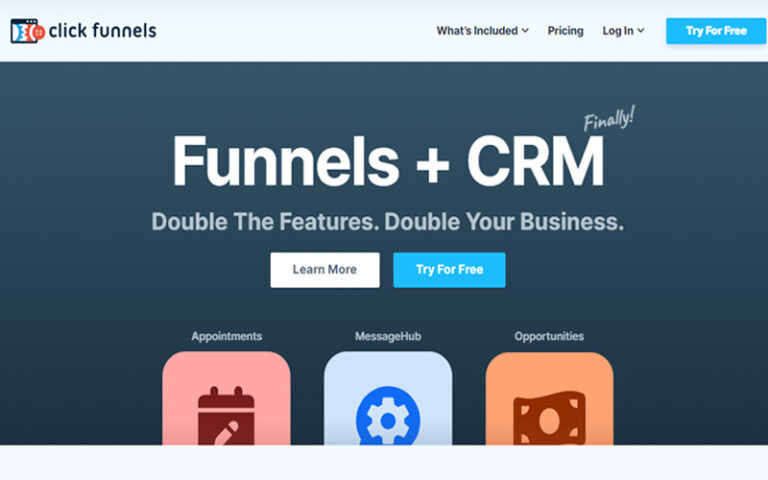

![FreshBooks Review [Features, Pricing, Pros-Cons 2024]](https://shadindigital.com/wp-content/uploads/2024/06/FreshBooks-Review-768x480.jpg)